FALL | WINTER 2022









Holding Court with U.S. Tennis Association’s Ed Neppl P. 18











Holding Court with U.S. Tennis Association’s Ed Neppl P. 18


Ihave enjoyed getting to know UW–Madison’s new chancellor, Jennifer L. Mnookin, over the past several months. She is a collaborative, visionary leader and a strong advocate for the initiatives we are pursuing in Roadmap 2025, the Wisconsin School of Business’ strategic plan.
In a recent WSB event with Chancellor Mnookin, she shared some highlights of her early days on the job. Among her observations is how fiercely dedicated UW–Madison alumni are to this institution. The strong sense of pride among our alumni has resonated deeply and immediately with the chancellor as she travels the state and engages with many of you.
Chancellor Mnookin also offered her perspective on leadership, reflecting specifically on how much she enjoys the opportunity to celebrate the success of others. I share that sentiment and see this publication as one of many opportunities to showcase the success of our Business Badger community.
In the pages that follow, you’ll read about how Ed Neppl, CFO of the United States Tennis Association, lets empathy drive his
extraordinary career (page 18). You’ll get a sneak peek at how Lindsey Uselding has taken her family business to a new HGTV show (page 10). And, you’ll see how Singari Seshadri has blazed an entrepreneurial path that creates access for others (page 8).
These success stories are just a few among many that we could share from our amazing alumni network. From professional achievements to personal milestones, Business Badgers are scoring big wins each and every day. Hearing about your successes gives me—and our new chancellor—a great deal of pride.
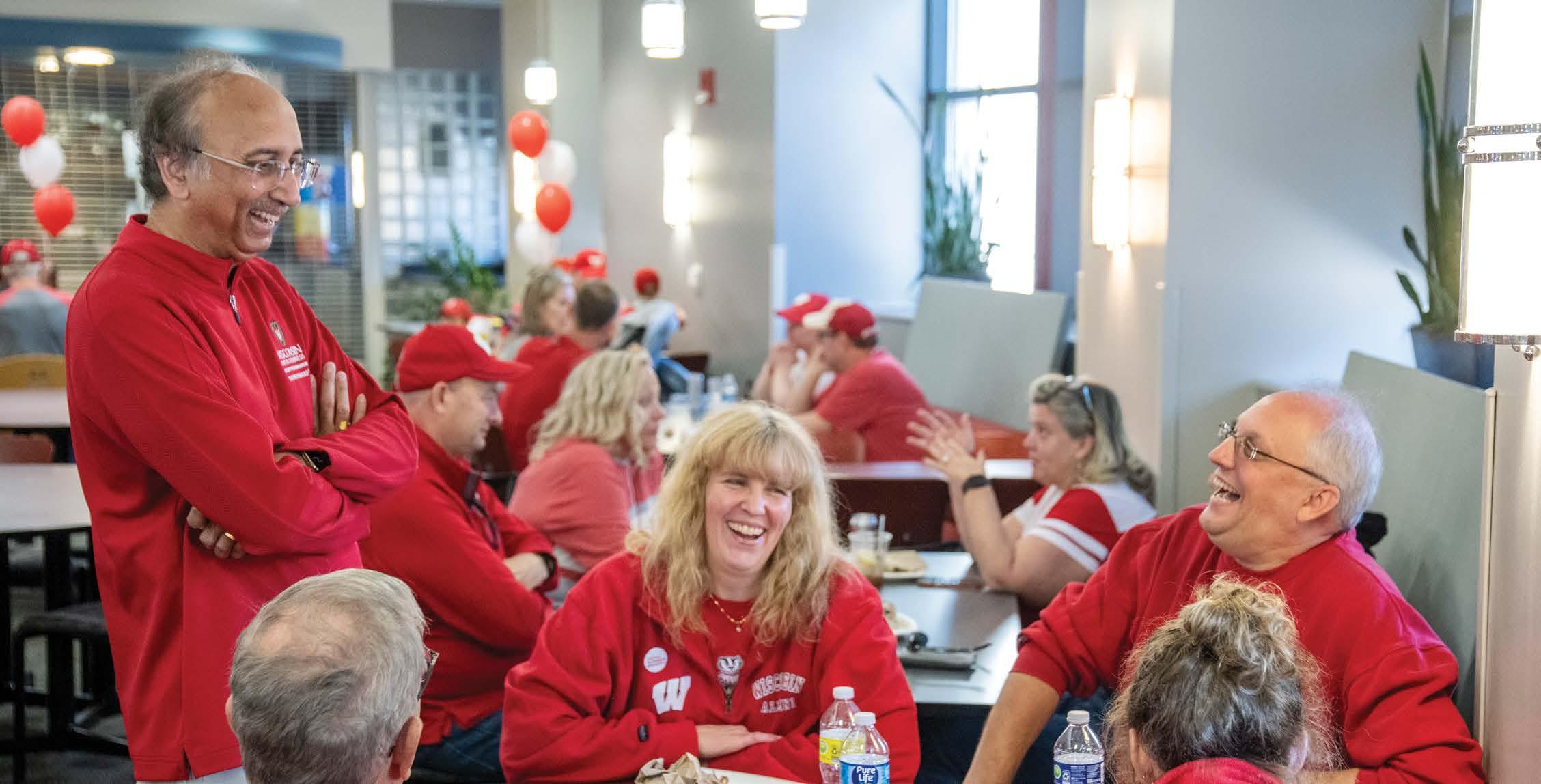

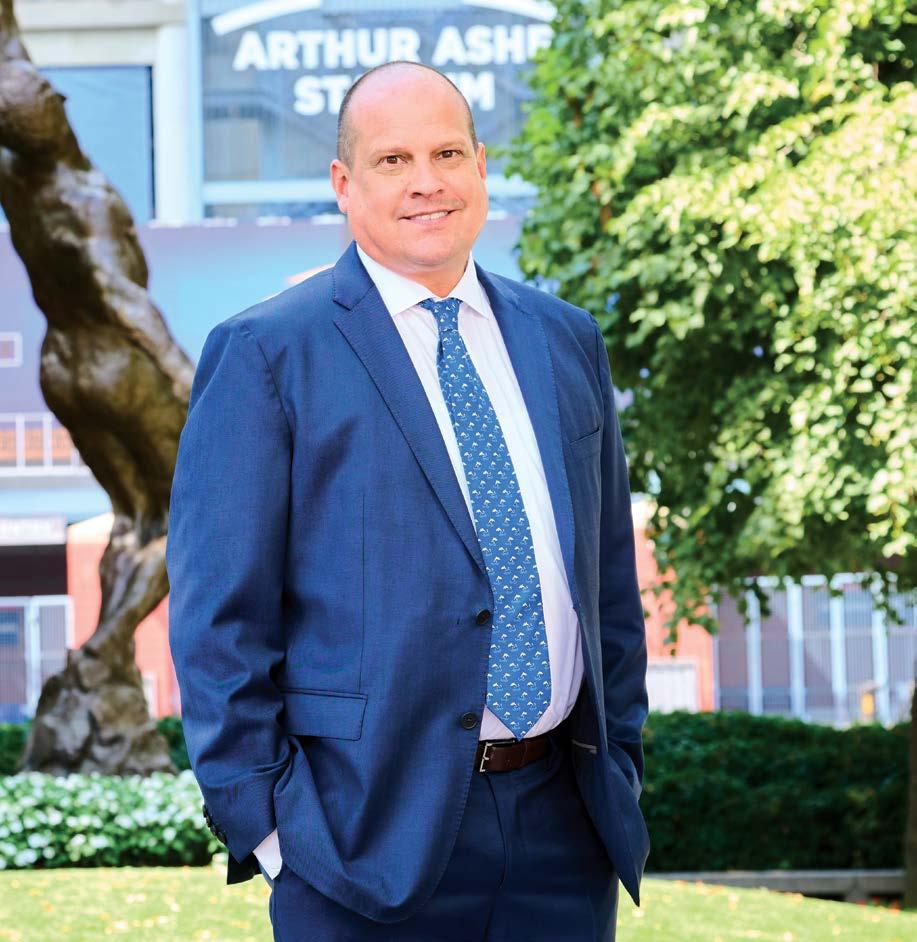

ucky Badger is one of the most iconic mascots in college sports—and Wisconsin fans have Bill Sachse (BBA ’50) to thank for that.

Without Sachse’s contributions, Bucky may have never leapt off the page and into our hearts.
With a little creativity—and a lot of papier-mâché—Sachse commissioned the design of the very first Bucky Badger head in 1949 with help from fellow students Connie Conrad and Bill Sagal (BS ’51).


Working off an illustration of UW–Madison’s then-unnamed, sweater-clad badger, the team designed a wearable head to be placed atop a member of the cheerleading squad. The trio of students then debuted their creation at a 1949 football game, and the rest is history.
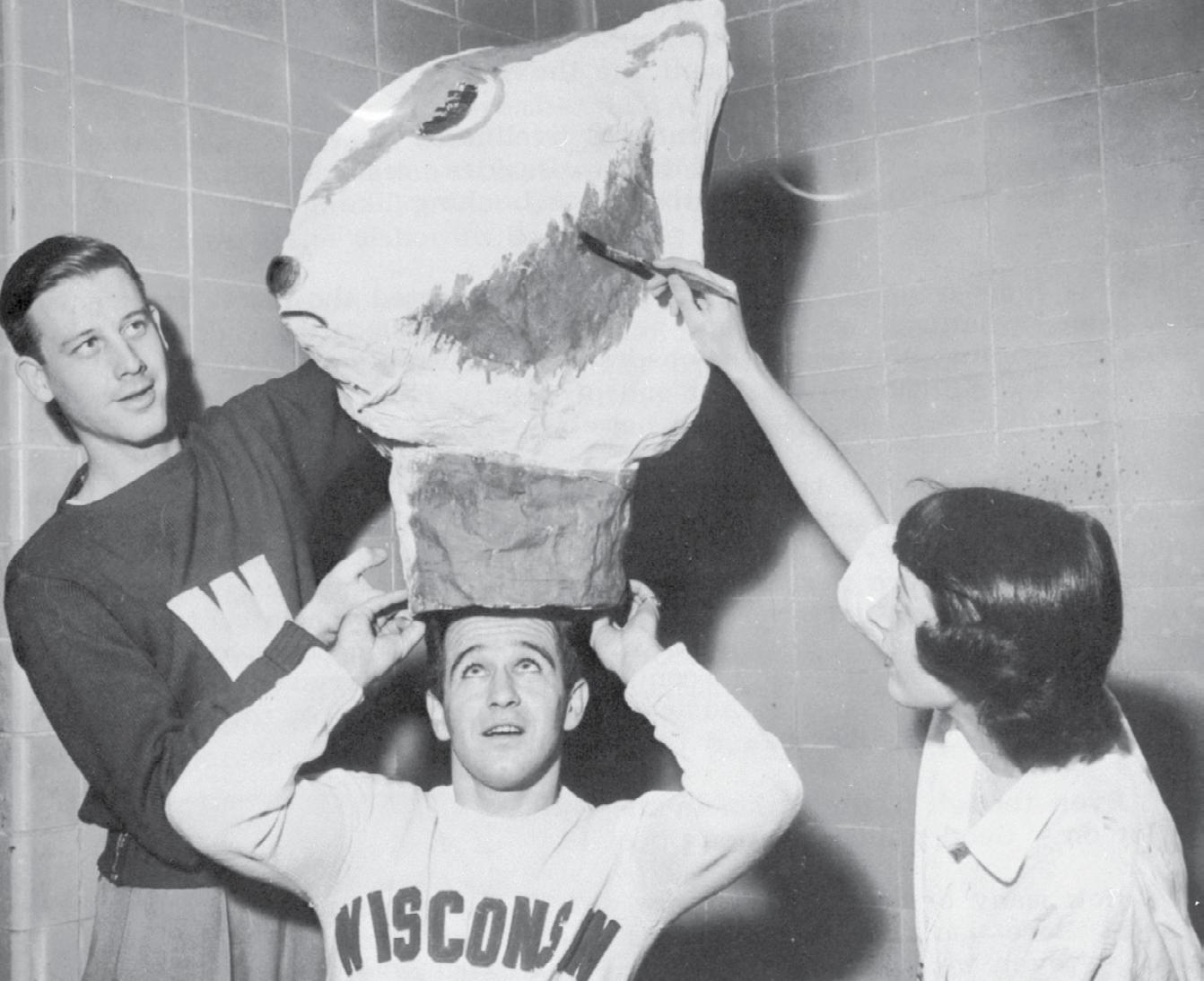
While Bucky’s outward appearance has changed over the decades, his fighting spirit and endless enthusiasm has remained the same for more than 70 years.
WSB proudly salutes Sachse, who passed away in 2012. He was a true Business Badger who wasn’t afraid to take the phrase “if you want to be a Badger” quite literally. ◀
| EDITORIAL |
MANAGING EDITOR
Betsy Lundgren (BA ’03, MA ’05) WRITER Chris Malina
CONTRIBUTING WRITER Haley Tollison (BA ’20)
| DESIGN & PHOTOGRAPHY | ART DIRECTOR AND DESIGNER Shaysa Sidebottom PHOTOGRAPHERS Vincent Gonzalez Adam Lerner Paul L. Newby II
| ADVISORS |
EDITORIAL
Sandra Bradley (MS ’90) Kaylene Christnovich
Sirinda Pairin (BA ‘15) Binnu Palta Hill (BA ’97) BRAND Katie Schauer
© 2022 Board of Regents of the University of Wisconsin System
Update is published biannually. All rights reserved.
PUBLISHER
Wisconsin School of Business Grainger Hall 975 University Avenue Madison, WI 53706 business.wisc.edu/update
University of Wisconsin–Madison is an equal opportunity and affirmative action educator and employer.
Cover photo by Paul L. Newby II
BRAND MANAGER, NATURESWEET SAN ANTONIO, TEXAS
It’s a new industry and category for me, which forces you to lean on the core fundamentals of marketing. It’s fun being at a smaller organization because you get to be involved in so much more. I’m also learning that we can plan as much as we want, but sometimes the weather dictates what’s being grown (or not) in our greenhouses.
A career is not solely a vertical climb. You’re going to have some upward and sideways movements, but you really have to think about how your next role helps you grow as a person and professional. For me, it was about finding that strong balance in a place I knew I could grow with people that I knew would ultimately support me.
I really enjoyed Jan Heide’s marketing class. Not only is he very knowledgeable about marketing, but he teaches the important soft skills, as well as the importance of how you present yourself and how you connect with people. Also, my friends and I loved the Terrace and sharing some Spotted Cow beer.
Trujillo has managed numerous food and beverage brands from Corona Extra to Progresso. | A wild summer: In 2009, Trujillo got married, was downsized, moved to Madison, and started his MBA. | Career highlight: Moving back to his home state of Texas to market Big Red soda— something he grew up drinking. | Newest hobby: Coaching his son’s baseball team.
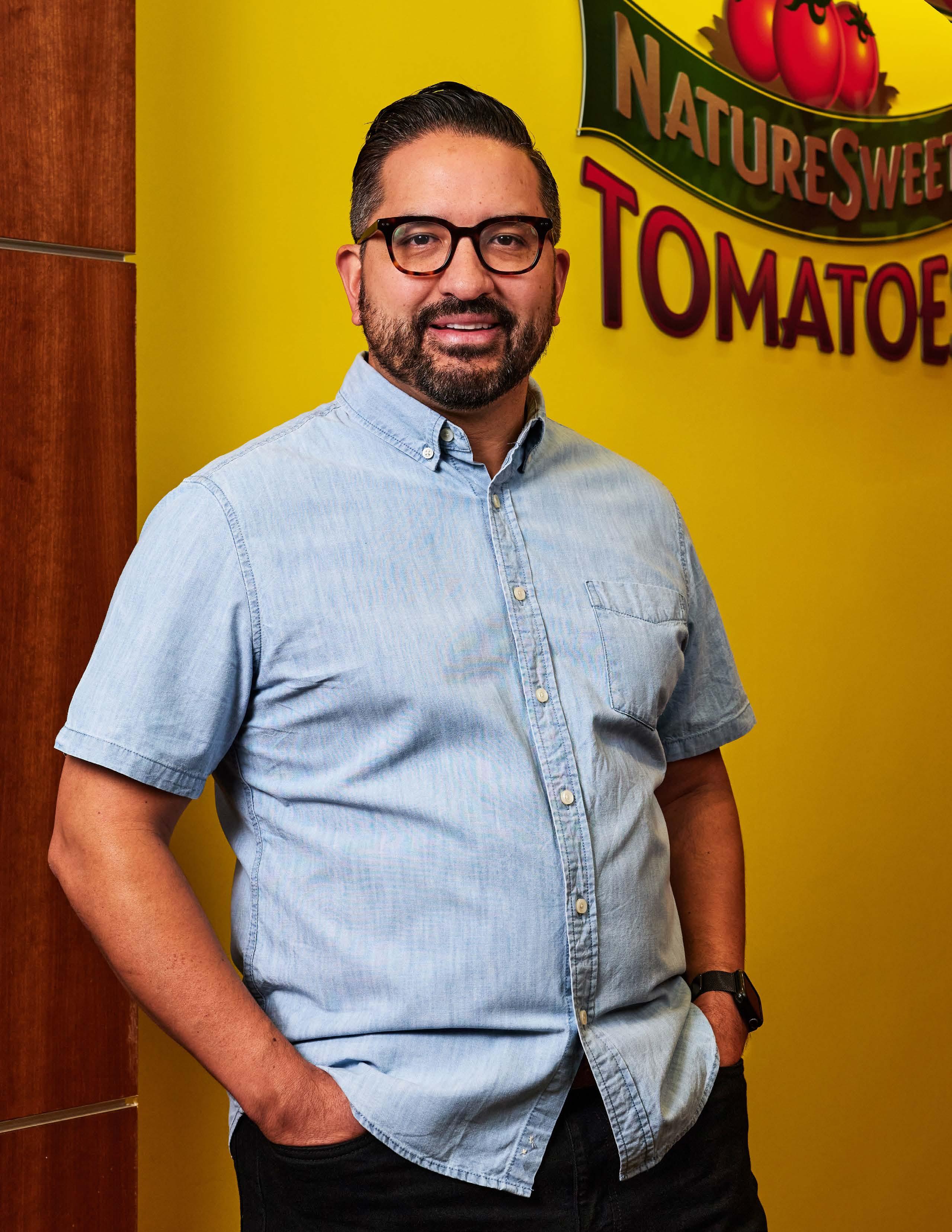
What’s it like building a snacking tomato brand?
What’s important to you when seeking a new job?
What is your favorite WSB memory?
Oh, and a few more things:
To read more, visit business.wisc.edu/news
Building on recent innovation with flexible offerings and curriculum modernization, WSB is redesigning the Wisconsin Executive MBA Program. The redesign follows the successful launch of the Wisconsin Professional MBA, a new hybrid program delivered through a mix of in-person and virtual learning, and is part of an effort to develop an agile, market-driven portfolio of graduate degrees.
The redesigned program responds to industry demand, where executive-level professionals show a continual need to expand their skills and elevate their leadership to take on business’ shifting dynamics.
“Business is going through a rapid transformation. We want our programs to mirror the future of work and respond to the changing needs of the digital economy,” says Vallabh “Samba” Sambamurthy, WSB’s Albert O. Nicholas Dean.
The program will feature new and innovative courses, expanded experiential learning, additional leadership and strategy content, and increased executive mentoring. It will be offered in a more flexible delivery model, enabling students to better balance their careers and lives.
Enrollment is expected to open in Fall 2023 with classes starting in Fall 2024.

WSB ranked #9 among public institutions and #19 overall in U.S. News & World Report’s 2022-23 annual rankings for best undergraduate business programs. Several academic programs also garnered high marks:
ARTURO “TITO” DIAZ (BS ’15) KEMPER FOUNDATION DIRECTOR OF THE MULTICULTURAL CENTER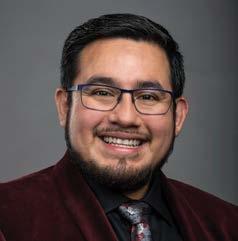
Diaz shared these remarks at the grand opening of WSB’s Multicultural Center in September 2022. The center is designed to build community, celebrate culture, and foster a sense of belonging among Business Badgers.
WSB recently launched the Marketing Leadership Institute (MLI), a dedicated center for fostering industry partnerships that propel student learning and advance marketing research and practice.
“The Marketing Leadership Institute signals the Wisconsin School of Business’ renewed and growing commitment to delivering world-class
marketing education and research,” says Neeraj Arora, Arthur C. Nielsen, Jr. Chair in Marketing Research and Education.
“This innovative new model puts industry connection front and center so that our students can experience immersive learning with top companies and have access to a wide network of marketing professionals.”
The MLI offers resources
for any undergraduate or graduate student interested in a marketing career. Three structural hubs—the A.C. Nielsen Hub for Marketing Analytics & Insights, the Brand & Marketing Management Hub, and the Tech Product Marketing Hub—offer community and support for the three marketing career pathways offered through the Wisconsin Full-Time MBA.
These pathways cultivate a specialized set of skills that uniquely prepare students for post-graduate opportunities.
The creation of the MLI aligns with several other investments WSB has recently made in its marketing programs to better position students to address complex challenges in today’s marketplace.
“Our Multicultural Center is among the first in the nation specific to a university business school. And it belongs to all of us.”
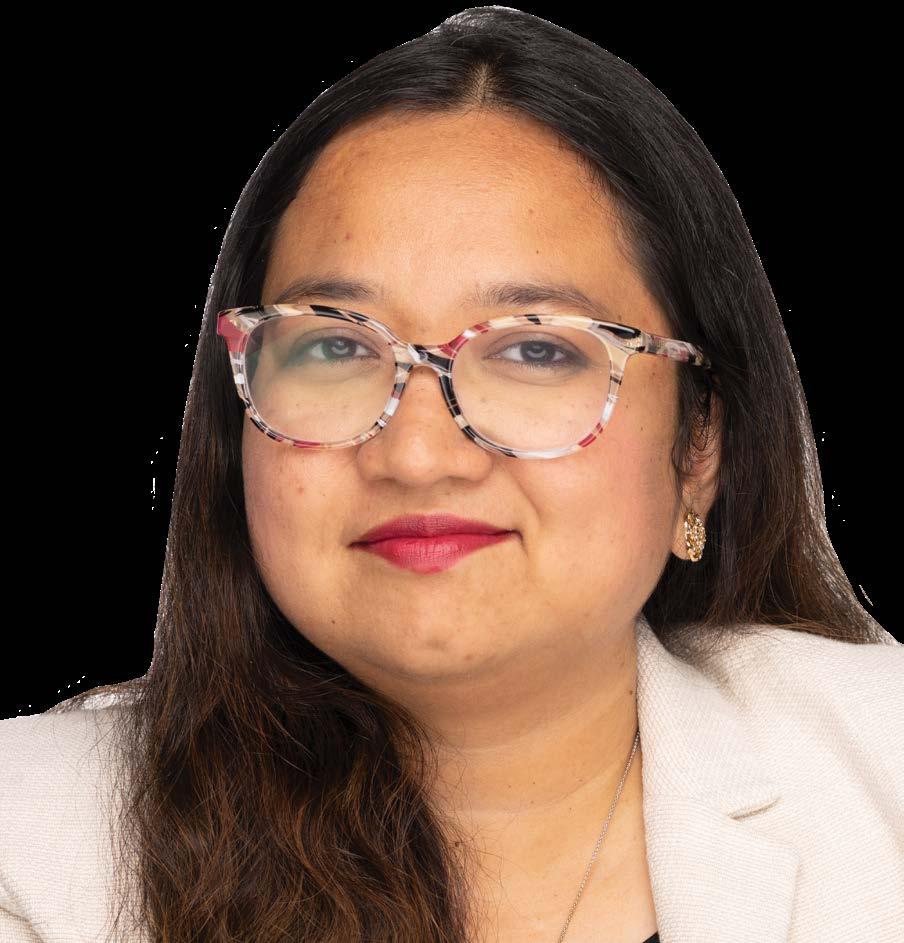
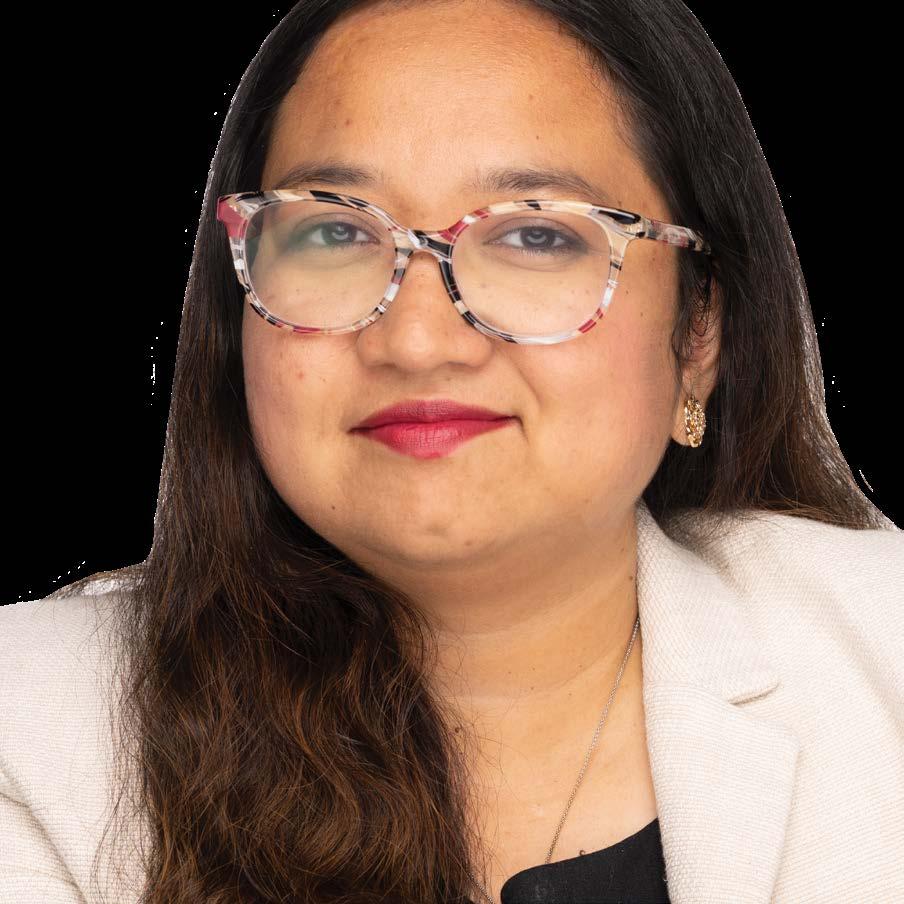 BY CHRIS MALINA | PHOTO BY PAUL L. NEWBY II
BY CHRIS MALINA | PHOTO BY PAUL L. NEWBY II
The plates have been cleared, the check has been paid, and you’re basking in the afterglow of a delicious restaurant meal. But instead of reaching for that after-dinner mint, you immediately grab your smartphone to tell the world about your experience.
Sound familiar? Over the past decade, online reviews have become an increasingly pervasive part of the experience economy.
For customers, leaving a review is an opportunity to sing the praises of a restaurant or product—or provide a few choice words about a poor experience.
In turn, businesses get immediate feedback from customers. But online reviews can be tricky to analyze. Star ratings never tell the whole story, and text reviews are rife with unstructured data that’s difficult to quantify.

That’s where Ishita Chakraborty comes in. An assistant professor of marketing with a background in computer engineering, Chakraborty harnesses artificial intelligence and algorithms to help businesses make sense of what customers are trying to say—or not say.
“My research team realized that we didn’t need to limit ourselves to just looking at the numerical rating, but we could actually start analyzing in real time the text people were writing,” says Chakraborty. “That really opened up a new Pandora’s box of questions.”
It’s research that Chakraborty began as a PhD student and has continued since joining the Wisconsin School of Business faculty as the Thomas and Charlene Landsberg Smith Faculty Fellow in 2021. One of her first major studies used a text mining framework and specially designed algorithm to help quantify tens of thousands of open-ended restaurant reviews.
The study’s model broke down reviews into individual phrases while identifying relevant attributes in each phrase (such as food or price) and their corresponding sentiments (such as “super tasty” or “my wallet hurts”). From there, the algorithm assigned sentiment scores from one to five, based on how positive or negative the comment was, and aggregated the total scores.
Chakraborty’s starworthy tips for assessing online reviews
“When you have a model that factors in these incentives and then puts the machine learning outputs into the model, you’re able to better evaluate those missing attributes and have more accurate scores,” she says.
Not all one- or five-star reviews are fake, but they often represent the extreme ends of the scale. Read the reviews in the middle for more context.
However, user reviews are often missing key information about attributes that would interest a restaurant owner. For instance, a review might mention a restaurant’s amazing food or atmosphere, but say nothing about service or price.
“There’s really a lot to learn from consumer silence,” Chakraborty says. “We want to correctly interpret how a customer actually felt about any missing attributes to help obtain the proper rating. To do that, it helps to understand why reviewers are leaving reviews in the first place.”
While it’s true that reviews can be motivated by many factors, Chakraborty narrows reviewer motivation down to three major segments: status seeking, a need to vent or praise, and good oldfashioned altruism.
It’s a model that could be especially beneficial for chain restaurants. Chakraborty’s research shows that on a five-star scale, chains with strong brand recognition are typically rated almost a full star lower than comparable independent restaurants.
“Reviews of established brands tend to use a lot of words regarding expectations being met or not, whereas when we looked at the reviews of independent restaurants, we generally saw words related to novelty or being surprised,” Chakraborty says.
Anyone can write a Google or Yelp review, but some platforms only allow verified purchasers to leave reviews or clearly denote when a review is backed by a verified sale.
Meanwhile, as online reviews get more complex, new avenues for research are opening up. Algorithms will need to be adjusted as many reviewers now augment their text reviews with photos. Others have taken to video-based social media platforms, such as YouTube and TikTok, to rant or rave about their experiences.
A reviewer’s other reviews can provide valuable information about motive. If a review seems off to you, see what that person is saying about other establishments and products, or whether they’ve issued a burst of reviews over a short period of time.
Reviews are also increasingly becoming a two-way street, with businesses now being able to publicly respond to reviews. Chakraborty is interested in learning what strategies are most effective when responding and how a manager’s response to a review may impact future reviews.
“We always end up finding new questions and that’s what’s exciting about this research,” Chakraborty says. “The nature of questions has been evolving so there’s always something to look forward to.” ◀
Singari Seshadri’s entrepreneurial spirit has driven a career focused on access and innovation
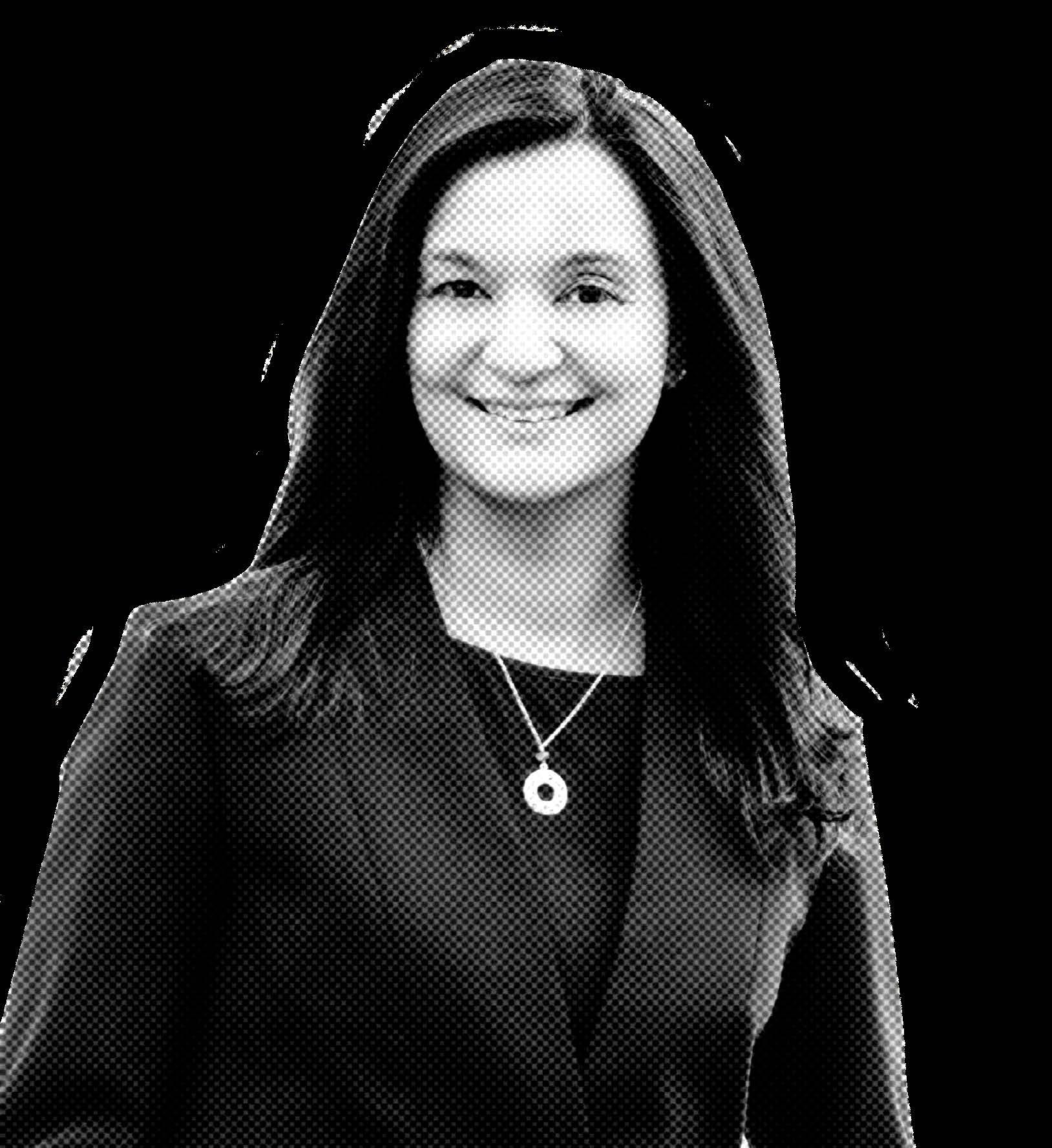 BY CHRIS MALINA ILLUSTRATION BY SHAYSA SIDEBOTTOM
BY CHRIS MALINA ILLUSTRATION BY SHAYSA SIDEBOTTOM
Singari Seshadri (MBA ’96) acknowledges her career has taken a few zigzags over the years.
From her early days in venture capital, to her current role as head of portfolio for Nike’s Valiant Labs, her career path has been anything but a straight line. Along the way, she’s switched industries, made cross-country moves, taken a step back from work, and even founded companies.
“I’ve made so many career pivots that I used to think of it as a negative,” she says. “But it’s made me who I am today and I’ve learned so much from it.”
However, if there’s one thread that ties together Seshadri’s experiences, it’s her continuous push to make business and entrepreneurship more accessible—especially for women and other underrepresented minorities.
At the end of the day, Seshadri knows that entrepreneurship isn’t for everyone. But she’s also a firm believer that everyone should at least have the means to give it a try.
Seshadri’s first taste of business came as a child growing up in India. Her mother, an artist and entrepreneur herself, owned and operated a textile printing business, and Seshadri pitched in by keeping her mom’s books.
“I was always a numbers person,” she says. “I loved accounting and finance and knew I wanted to pursue higher studies in that field.”
After graduating with an accounting degree, Seshadri decided to continue her studies in the United States and was impressed by the rigor and reputation of the Wisconsin MBA program. While in graduate school, she worked part-time for a Milwaukee-based venture capital firm and stayed on after completing her degree.
For someone with aspirations of working on Wall Street, a career in venture capital was unexpected but also exciting. However, the long hours and limited flexibility eventually wore on her. When her
family needed her, it led to the biggest pivot yet.
Making the choice to step away from work to care for a young child and ailing parent wasn’t easy. Trying to later rejoin the workforce was even harder.
But she quickly learned she wasn’t alone. While living in New York, she met other women—former lawyers and investment bankers—who told a similar story. “There were many of us who liked working, wanted to have some aspect of work, but with more flexibility than we had before,” she says.
That’s when Seshadri’s entrepreneurial spirit came alive. She saw the potential in bringing these women together to create something. The result was Samiti, an incubator and crowdfunding platform for women entrepreneurs that later evolved into Sparkup, which specifically focused on women who had taken a career break and were exploring entrepreneurship as a pathway to return to work.
“The Sparkup journey was very organic,” Seshadri says, noting that it started and grew as a collaborative, community-led initiative. “For me, it was a very fulfilling passion project.”
When the opportunity to move to the West Coast came along, Seshadri handed the reins to her partners and shifted her focus to finding her next career opportunity—which
soon came calling at Stanford University.
As head of Stanford Venture Studio, Seshadri was tasked with breathing new life into the university’s largest student entrepreneurship program. The solution, as she saw it, was to throw open the doors.
“We positioned it as a place where students could come learn and experiment
put it out there,” Seshadri says. “We ended up with more than 5,000 signups from all over the world.”
Then in 2021, opportunity once again came knocking— or perhaps in this case, it came running. Valiant Labs, Nike’s digital innovation arm, needed someone with Seshadri’s skills and entrepreneurial mindset.
Seshadri was intrigued
with entrepreneurship, try it out in a safe space,” she says. “Any student who wanted to join could join, even without an idea. It’s not that we lowered the bar. There was no bar.”
Later, when COVID-19 upended operations, Seshadri played a key role in launching and running Stanford Rebuild: an initiative to bring Stanford’s resources to entrepreneurs around the world seeking solutions to pandemicrelated issues.
“We took curriculum and programming that was typically only available to Stanford-affiliated folks and
by Valiant, inspired by the women-led team, and also taken with Nike’s mission of making sport and wellness accessible to everyone.
Pivoting to a job in corporate innovation wasn’t something she deliberately planned. “But I thought, what the heck, let me give it a shot,” she says.
At this point in her career, Seshadri feels fortunate that she can be picky about where she works. And at the end of the day, she can appreciate that the career path she’s taken—zigzags and all—brought her exactly where she wants to be today. ◀
“It’s not that we lowered the bar. There was no bar.”SINGARI SESHADRI (MBA ’96) on making student entrepreneurship programs more accessible

It’s three o’clock in the morning, the phone is ringing, and Lindsey Uselding (BBA ’02) knows that somebody needs help.
On the other end of the line, it could be a panicked homeowner or devastated business owner dealing with damage from a storm, fire, or other disaster. As vice president and co-owner of Ungerman, Inc., a Twin Citiesbased property restoration and mitigation company, Uselding has heard and seen it all. But no matter who calls, her approach is the same.
“The number one thing that we need to do is be available, be helpful, and get them through the process,” Uselding says. “When you go through an insurance loss or an emergency in your home or business, it’s something you didn’t plan for. It’s unexpected.”
It’s a career she loves, even though it was rather unexpected itself. After all, when her dad sat her down over breakfast and asked her to manage the family business, Uselding was happily employed in the corporate world.
“Dad had a pen and paper and put a line down the center and wrote ‘pros’ and ‘cons’ to joining the family business,” Uselding says. “To be honest, the cons were longer than the pros.”
But family has always come first for Uselding, and just like the company’s clients, her dad needed help. She’s also never been able to say no to a challenge: not when her guidance counselor said she couldn’t get into UW–Madison, not when the Badger dance team said freshmen weren’t allowed on the squad, and certainly not when Target—where she’d eventually work for more than a decade—initially rejected her for an internship.
Now, as a successful business owner, Uselding finds herself taking another leap— this time into television—and her message is clear: Challenge accepted.
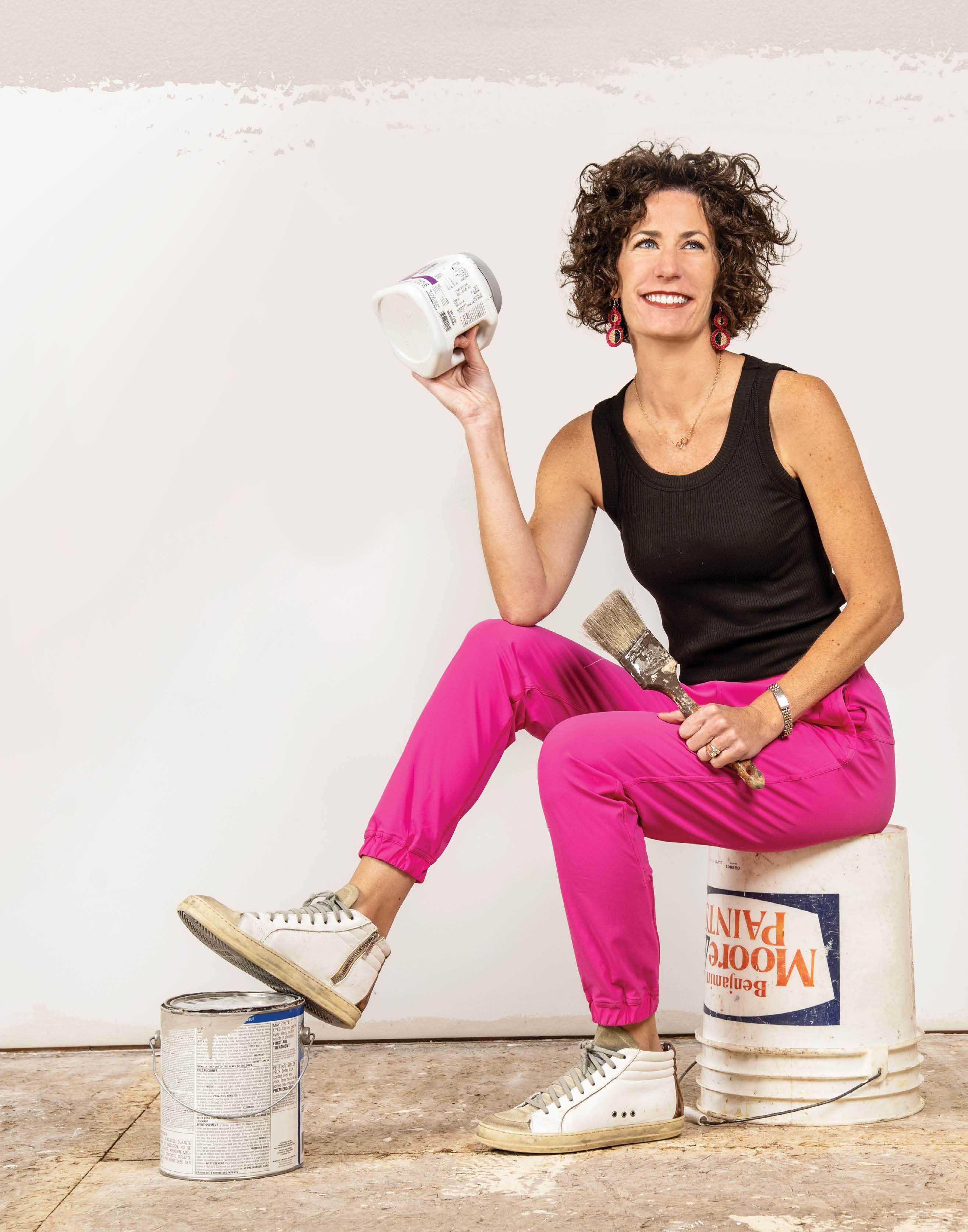
Family first Born and raised in Edina, Minnesota, Uselding remembers a childhood surrounded by family: not just her parents and sister, but also the dedicated people who worked alongside her dad to build a successful company.
“My dad always wanted every employee to feel like a family member, because it was that important,” she says.
Growing up around the business, visits to job sites were as common as track meets and dance recitals.
Sisters Lindsey Uselding (left) and Kirsten Meehan make their TV debut in early 2023 with Renovation 911.
Below: Personalities on the show also include father and Ungerman CEO Ted Brinkman (left) and senior project manager Collin Camp.
Being surrounded by so much family meant plenty of support, but when it came time to select a college, Uselding knew she needed to spread her wings.
“I needed to be a little uncomfortable and leave home, so I picked Wisconsin,” she says.

There, Uselding pursued her two passions: academics and dance. Both taught her leadership skills, how to give and receive tough feedback, and the importance of team culture—something she further refined after graduation as both an executive team leader and store director at several Target stores across Minnesota.
Then in 2013, Uselding was just settling into a new role at Target corporate when her dad came to her with the ask that would be the ultimate test of her leadership skills. She agreed to join the company, but on her terms.
“When my dad brought me on, he had worked in the business for 38 years,” Uselding says. “It was time to work on the business rather than in the business.”
Fortunately, Uselding already had a partner working in the business: her sister.


Kirsten Meehan (BA ’04) had been working field jobs at Ungerman during summer breaks throughout college, and after graduating from UW–Madison, stayed on with the company as a project manager and estimator.
The sisters, who had shared a room all throughout childhood and later attended the same university, now found themselves as partners in the family business—and later, as co-owners.
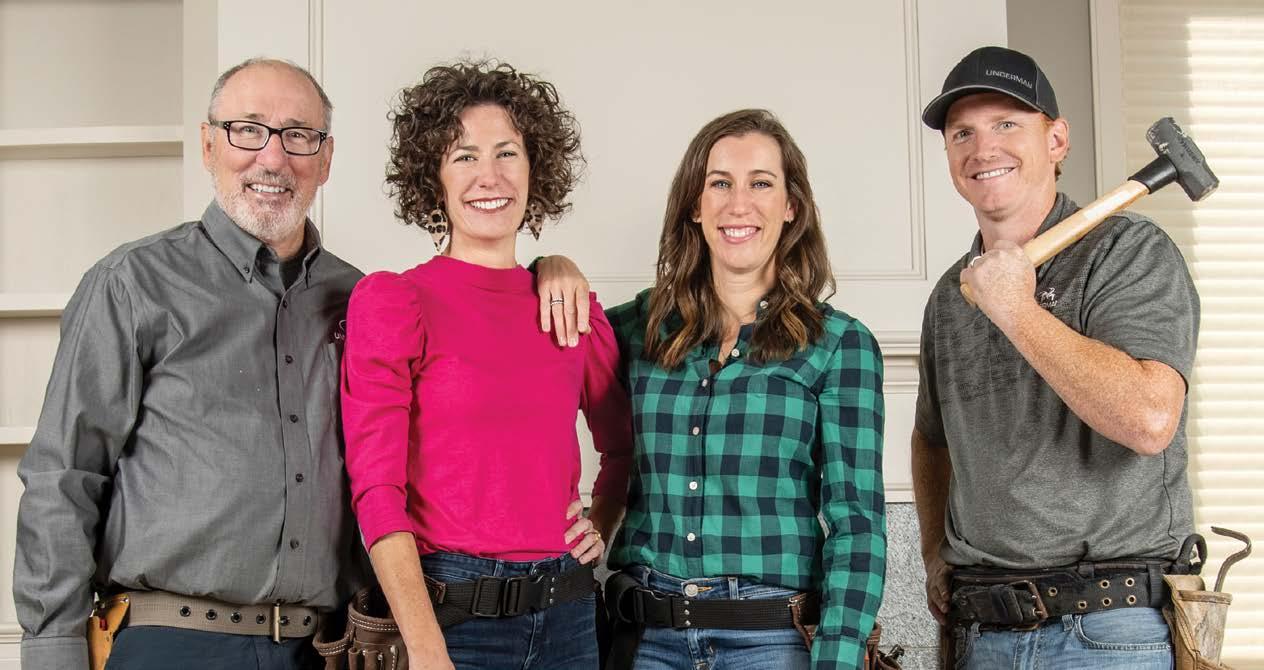
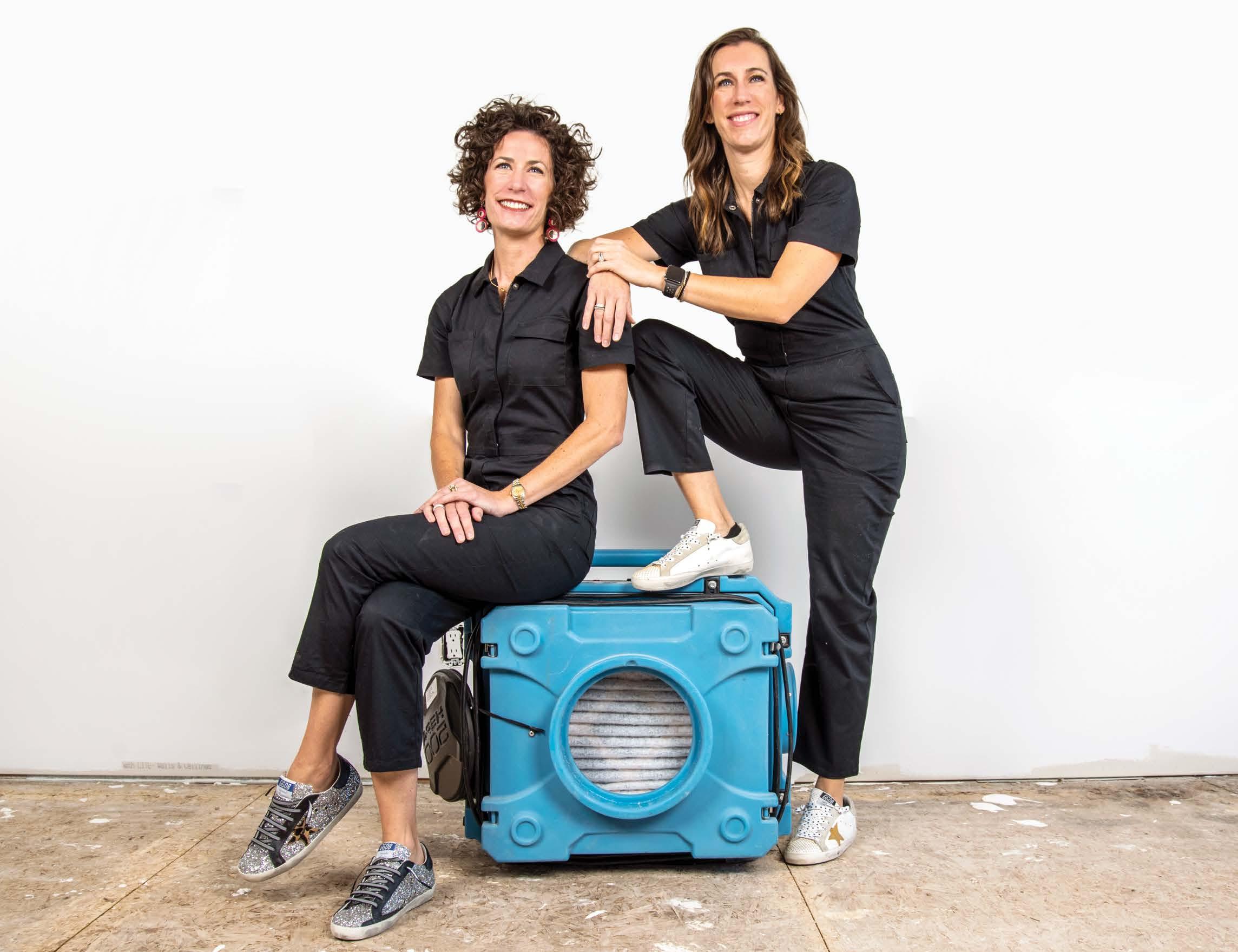
“Kirsten and I have always worked really well together,” Uselding says. “We know each other’s strengths and we leverage that.”
The result: Uselding estimates that Ungerman’s business has nearly tripled over the past ten years.
Soon, the rest of the nation will get to see how these two sisters get the job done.
Move over, Property Brothers
Chip and Joanna Gaines. Jonathan and Drew Scott. The list of iconic duos at HGTV is lengthy, and it’s about to get a little longer with the addition of Uselding and Meehan.
Renovation 911 is set to premiere in early 2023. The show features the sisters crisscrossing the Twin Cities, helping distressed homeowners through the emotional process of restoration and recovery.
Like many of Uselding’s ventures, it started with a no. A friend happened to know a producer on HGTV’s Fixer Upper and floated the idea that these sisters would make for a compelling TV show.
The idea was politely shot down—more than once. But perhaps fate intervened

a slate of eight, one-hour episodes.
Uselding says the show is a fairly accurate representation of what her company does on a day-today basis, although when the cameras aren’t rolling, you’re more likely to find her behind a desk than you are swinging a sledgehammer. That said, she’s not afraid to get her hands dirty, and hopes that the show will encourage viewers— especially women—to consider a career in the trades.

Beyond the show, the sisters aren’t slowing down. They’re also working on a new company, Practical Home, aimed at providing savvy solutions to make homes safer through preventative maintenance and design. It’s another venture that will require
LINDSEY USELDING (BBA ’02)

when said friend’s pipe burst in the middle of the night and she caught video of the sisters in action when they came to the rescue. Only then did the producer agree to an official pitch.
Working with a production company, Uselding and Meehan created a demo reel in 2019 which ultimately led to a pilot in 2021. It was such a hit with test audiences that HGTV immediately ordered
Uselding to step out of her comfort zone.
But as she’s proven time and time again, she’s not afraid to put in the work.
“You have to be able to soar with your strengths and continue to work on your opportunities,” Uselding says. “Once you can do that, you’re unstoppable.” ◀

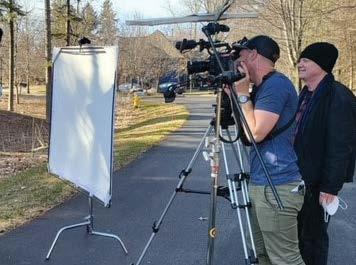
The team included directors of photography, executive producers, show runners, casting and line producers, audio mixers, and more.
18 emergency jobs were filmed for Renovation 911, from single room restorations to total house disasters.
Long days of filming led to some slaphappy moments, says Uselding. “Saying a simple sentence like ‘These cabinets have a beautiful modern feel’ came out as ‘These cabinets better have great curb appeal!’”
“Staging each home before bringing the clients back was a really touching experience,” she says. “These reveals will stick with us our whole lives.”
“Kirsten and I have always worked really well together. We know each other’s strengths and we leverage that.”Photo courtesy of RTR Media
Succeeding in business means being able to adapt to any situation. That’s true now more than ever.


Rapid advances in technology, COVID-19 upheavals, and more socially-conscious consumers have all created significant challenges in today’s business environment. Fortunately, WSB’s newest faculty members understand these challenges—and are rising to meet them.
Through research, new classes, and handson learning opportunities, these six individuals are sharing their expertise with today’s students and business leaders, equipping them with the skills and knowledge to tackle even the most complex challenges.
After all, great minds don’t always have to think alike—in fact, thinking differently and providing fresh perspectives is sort of WSB’s thing.
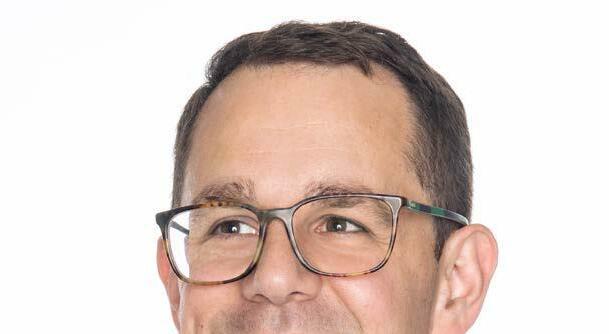
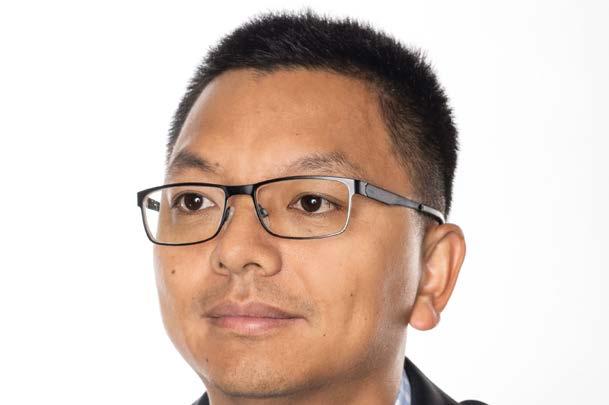
The adoption of digital platforms by businesses has created new distribution channels, reorganized supply chains, and given customers plenty of new options for engagement. When things work properly, it’s a win-win for everyone. But when these digital platforms have different interests than the businesses they serve, things can break down quickly—so coordination is key.
“The constantly changing digital landscape brings in substantial opportunities and challenges for any organization,” says Allen Li, who specializes in getting businesses with different interests on the same page.
It’s something that many businesses directly experienced during the COVID-19 pandemic. As businesses closed their doors during lockdown, many turned to digital platforms and apps to reach customers and keep revenue flowing. In the case of restaurants, many partnered with delivery platforms such as DoorDash and Uber Eats, despite the bite these services took out of a restaurant’s profit.
One of Li’s ongoing research projects—funded by a highly competitive Early Career Award from the National Science Foundation—examines possible regulatory policies to balance restaurant revenue, consumer surplus, and the sustainability of the ondemand delivery business.
Allen Li is the Michael and Mary Sue Shannon Professor and an associate professor of operations and information management.

The importance of health care can’t be overstated, but it’s also a major expense for individuals, employers, and perhaps most starkly, the government. Through programs like Medicare and the Affordable Care Act, the federal government spends hundreds of billions each year on health care—funded with tax dollars, so it’s important the money is spent wisely.
Dan Sacks studies the intended and unintended consequences of social programs, including health insurance. At WSB, he’s teaching a new course on health insurance in the United States, which explores why the health care market has historically been so challenging and how different insurers have survived or failed over time.
He’s also turning his lens on the intricacies of health care plan design and how that can impact consumers.
“One stream of my research looks at how smart health insurance plan design can reduce health care spending by steering patients towards high-value, lowcost care,” says Sacks. “That potentially means reducing spending without jeopardizing health.”
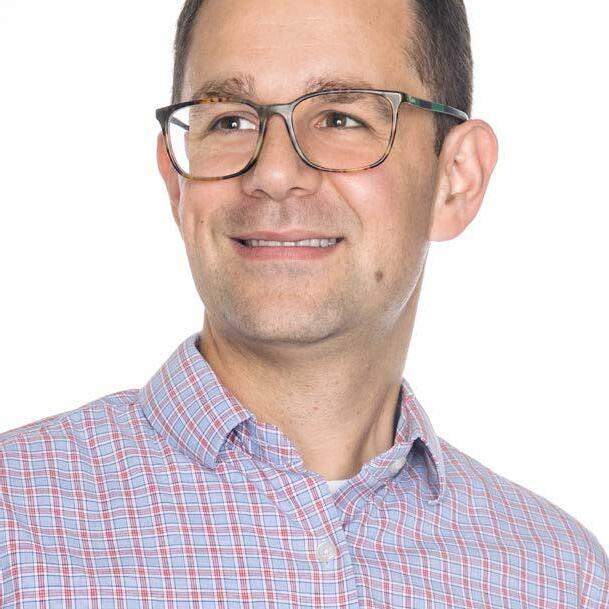

Neil Morgan has seen firsthand the difficulty many firms have with connecting their marketing activities to financial performance outcomes— something that has chief marketing officers everywhere frequently feeling like they’re in the hot seat.


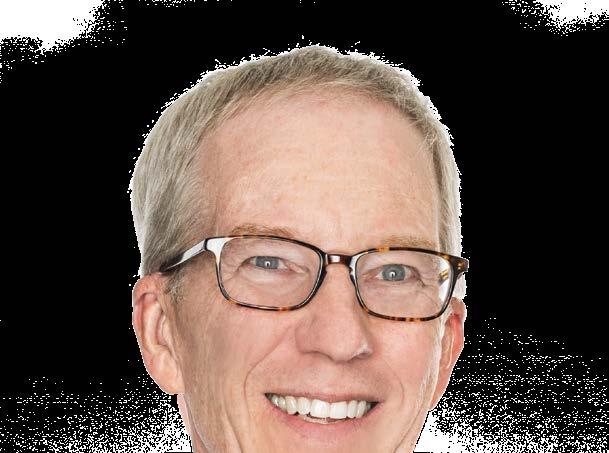
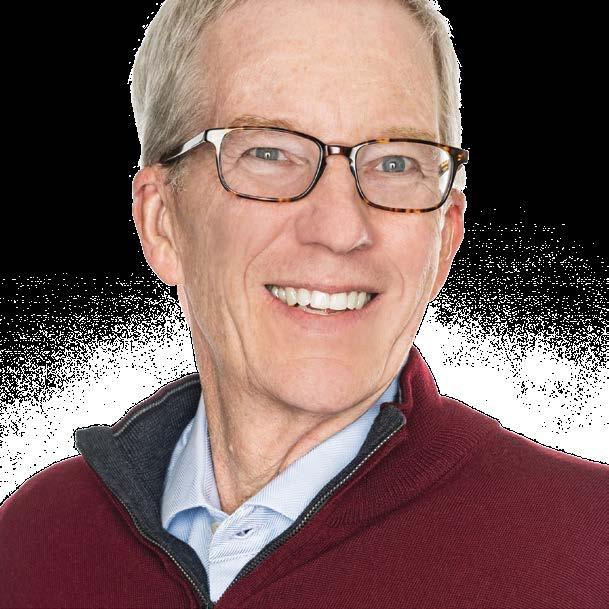
“CMOs are usually the shortesttenured C-level executives because they struggle to convincingly show how the marketing organization is contributing to growth,” says Morgan. “CEOs and CMOs need evidencebased help in figuring out what works, under what conditions, and how to ensure their marketing efforts really move the needle.”

Morgan’s research takes a data-driven approach to helping business leaders connect marketing assets and actions to firm growth and financial performance outcomes, as well as helping understand how to measure and manage the capabilities that drive such outcomes.
In the classroom, Morgan teaches marketing strategy and brand asset management to MBA students. ◀
Neil Morgan is joining the WSB faculty in January 2023 as an endowed professor of marketing.
B usiness success often comes down to making better decisions. The decisions made on an executive or managerial level, and the resource allocations that follow, determine the success or failure of an organization’s strategy. Needless to say, it’s a lot of pressure.
A distinguished scholar and social scientist by training, Michael D. Johnson develops management tools to help leaders better understand— and make decisions around—their entire portfolio of customers.
“My work helps firms consider the value of an entire portfolio of current and future customers with whom they have weaker or stronger relationships,” says Johnson. “This is important because business executives tend to oversimplify customer-related decisions by focusing, for example, on a subset of loyal customers rather than the value of an entire portfolio of relationships.”
The result? Firms are able to make more informed strategic choices on everything from organizational design to corporate social responsibility.
“The common thread across my research is my interest in decision making and generating new knowledge that is applicable to real-world problems,” says Johnson. “That’s what excites me, whether it is making better business decisions, increasing corporate social responsibility, or fostering innovation and customer satisfaction.”
As for his own decision making, Johnson says the choice to come back to his alma mater—this time to teach and lead the marketing department—was an easy one. “It’s just great to be home,” he says. “Once a Badger, always a Badger!”
D. Johnson is chair of the Marketing Department.
Michael D. Johnson
(BS ’78) helps business leaders make better decisionsMichael
NeilNeil Morgan, submitted photo

New or improved technologies have the power to transform businesses—but not always for the better. For every strike-it-rich success story (think Apple launching the iPod), there’s a costly flop that never quite catches on (think Microsoft launching the Zune).
With a background in marketing and information systems, Yi Liu builds theoretical models to show business leaders the potential outcomes of adopting new technologies.
“It’s important for business leaders to be able to clearly see both the opportunities and the challenges brought by new technologies,” he says.
One recent area of interest for Liu is the potential implementation of content moderation technology on social media. While many users have called for stricter moderation on platforms like Facebook and Instagram, the decision to implement it could mean a hit to the bottom line.
“We found that sometimes social media platforms, especially those making money from advertising, may lack the incentive of pursuing an advanced technology for extreme content detection,” Liu says. “That’s because a less-than-perfect technology may help them earn a higher revenue.”
Yi Liu is an assistant professor of marketing.

A ndrea Tillet’s research evaluates the effectiveness of regulators and standard setters (such as the Securities and Exchange Commission) in accomplishing their mission of setting high-quality accounting standards and enforcing the application of those standards.
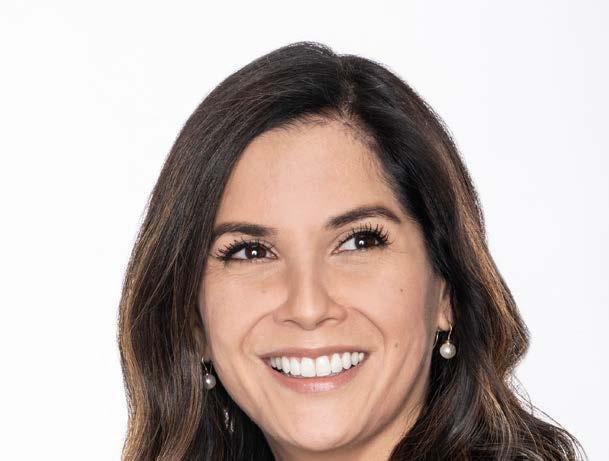
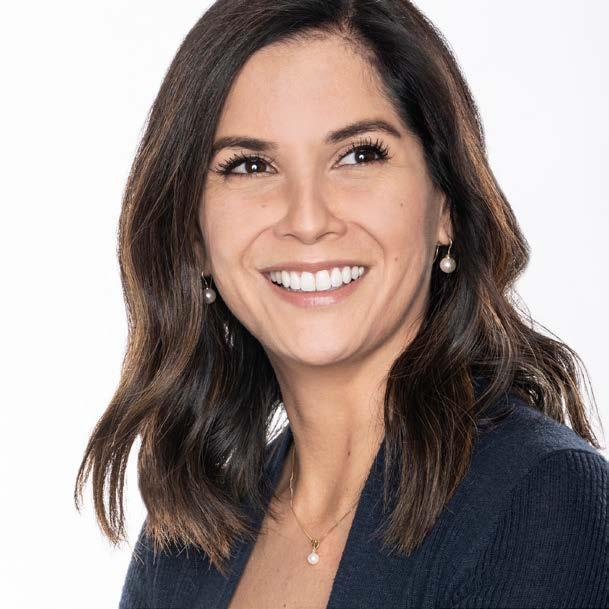
“Regulations are costly to comply with, so it is important to constantly evaluate whether the benefits of regulation outweigh the costs,” she says.


It’s traditional—and important—accounting fare. But it’s not all that Tillet is thinking about. “There has been a recent uptick in discussion around how accountants can stay relevant in today’s business world,” she says. “Investors don’t simply care about revenue and earnings anymore. They also care about a firm’s contributions to society, their local environment, and more broadly, the planet.”
This non-traditional financial data is taking on increased importance in today’s business climate, and Tillet is preparing WSB students to be part of that change.
“Future generations of accountants have to learn how to report on things like greenhouse gas emissions, pay equality, and board diversity. It’s an evolving and challenging landscape.” ◀
Andrea Tillet goes beyond traditional financial reporting
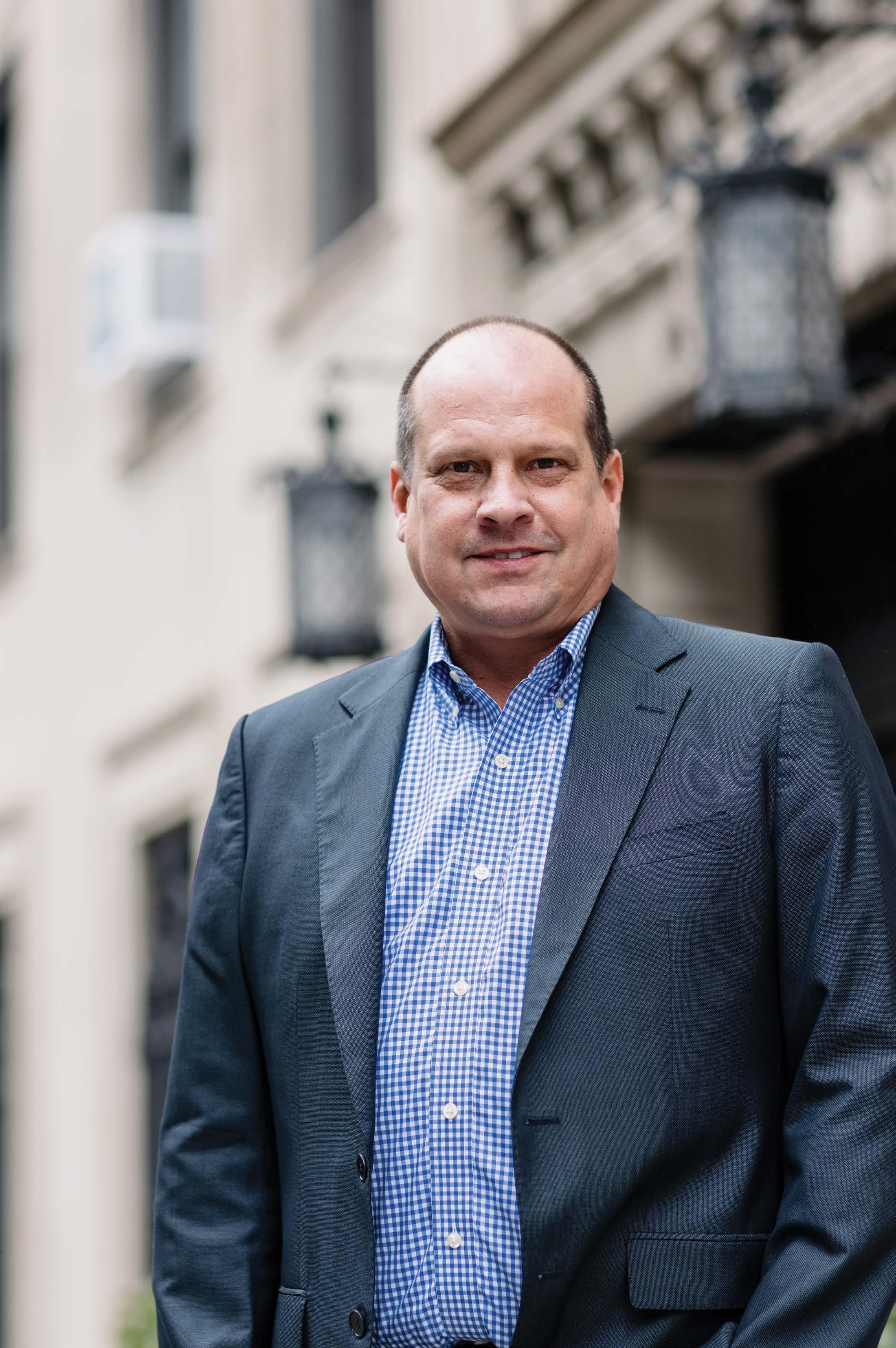 BY CHRIS MALINA | PHOTOS BY ADAM LERNER
BY CHRIS MALINA | PHOTOS BY ADAM LERNER
At a New York City reception with other UW–Madison alumni, somebody turned to Ed Neppl (BBA ’90) and remarked, “You’ve had the most interesting jobs of anyone in this room.”
It’s an assessment that’s hard to argue with when you consider that Neppl has worked at Walt Disney Imagineering, Universal Studios, and NBC Sports and Olympics—and that’s not even including his current position as chief financial officer for the United States Tennis Association (USTA). There, his duties range from the ordinary (financial management functions) to the not-so-ordinary (leading a multi-million-dollar financing effort to renovate a major sports facility).
But ask Neppl what he’s most proud of during his career, and you’ll hear him describe things that don’t fit neatly on a résumé, such as leading with empathy, being a mentor, and showing
young professionals what it means to live an authentic life. They’re traits he honed during his time at the Wisconsin School of Business, but have also been developed through lived experience as a world traveler, a team leader, and an openly gay business professional.
“I’m really lucky to have had some amazing opportunities with my career and I’m fortunate to be in a position to give back,” Neppl says. “It has also been very important to me, especially as an executive or leader within an organization, to be out and be comfortable with who I am. I feel an obligation to make sure people can see who I am for real and know that you can be successful in whatever you do.”
So, while he’s grateful for the compliment about his career, he’s even more grateful for how it’s allowed him to make life just a little bit better for those around him.
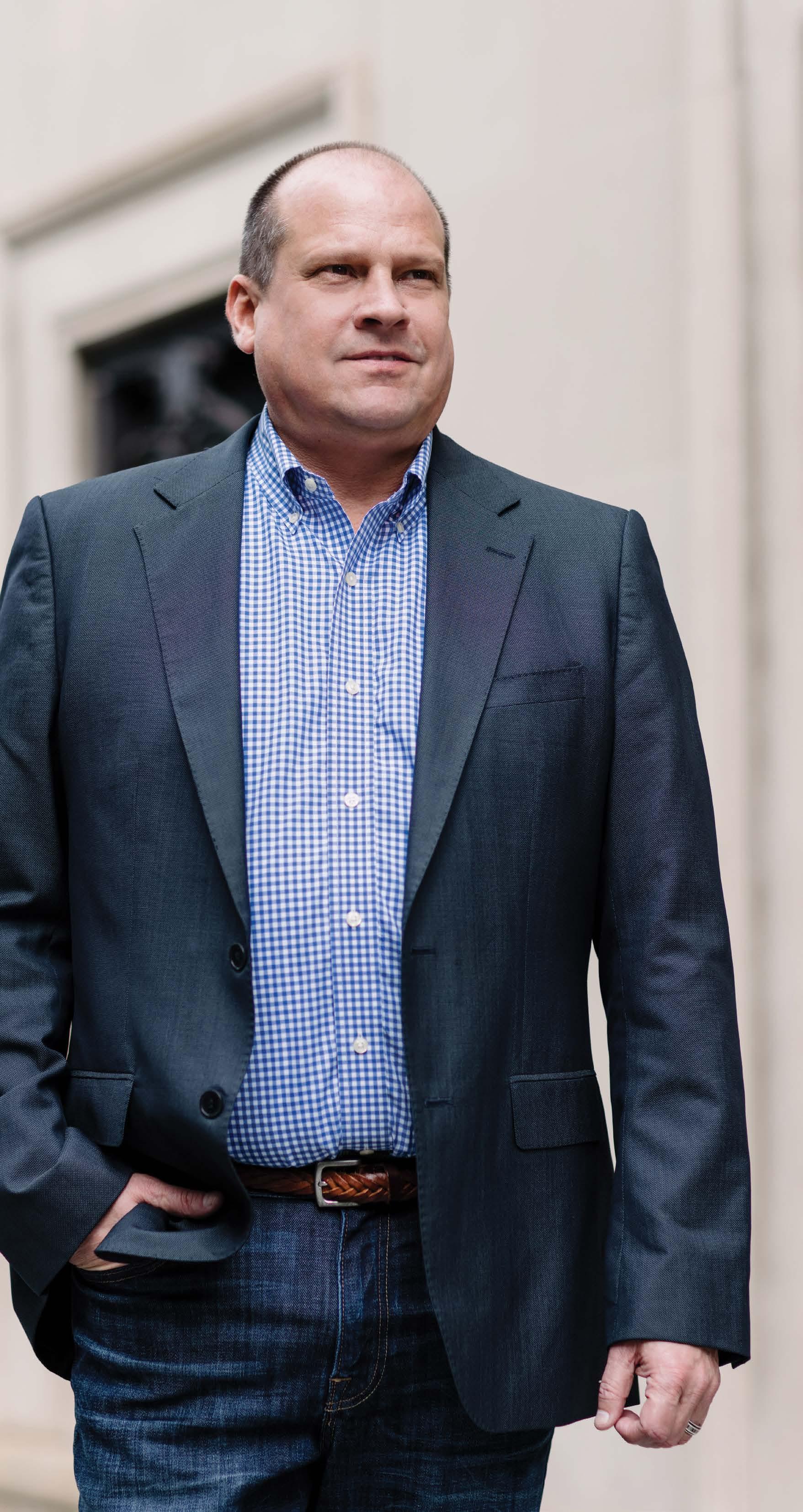
CFO, United States Tennis Association
Highlight: Putting on the U.S. Open
CFO, NBC Sports and Olympics
Highlight: Attending the 2008 and 2010 Olympic Games
CFO, Universal Studios Operations
Highlight: Experiencing the backlot of movie sets and film equipment

A native of Stevens Point, Wisconsin, Neppl came to UW–Madison and pursued an industrial engineering major before pivoting to finance and accounting at WSB. By day, his business classes taught him key leadership and management skills. By night, he put that education to the test in a very practical way working as a house fellow in the residence halls.
Even when dealing with roommates at each other’s throats, Neppl quickly discovered that having empathy went a long way in resolving sticky situations.
“You definitely learn how to work with all sorts of people and you quickly figure out how you need to act in order to get the result you’re looking for,” he says. “That experience was actually a really important part of building my management skills, which I still draw upon even today.”
After earning his degree, Neppl moved to Chicago to begin his business career. But two jobs and a handful of cold winters later, Neppl decided to go west—a move that not only opened up new career doors, but brought him closer to his now-husband, Scott.
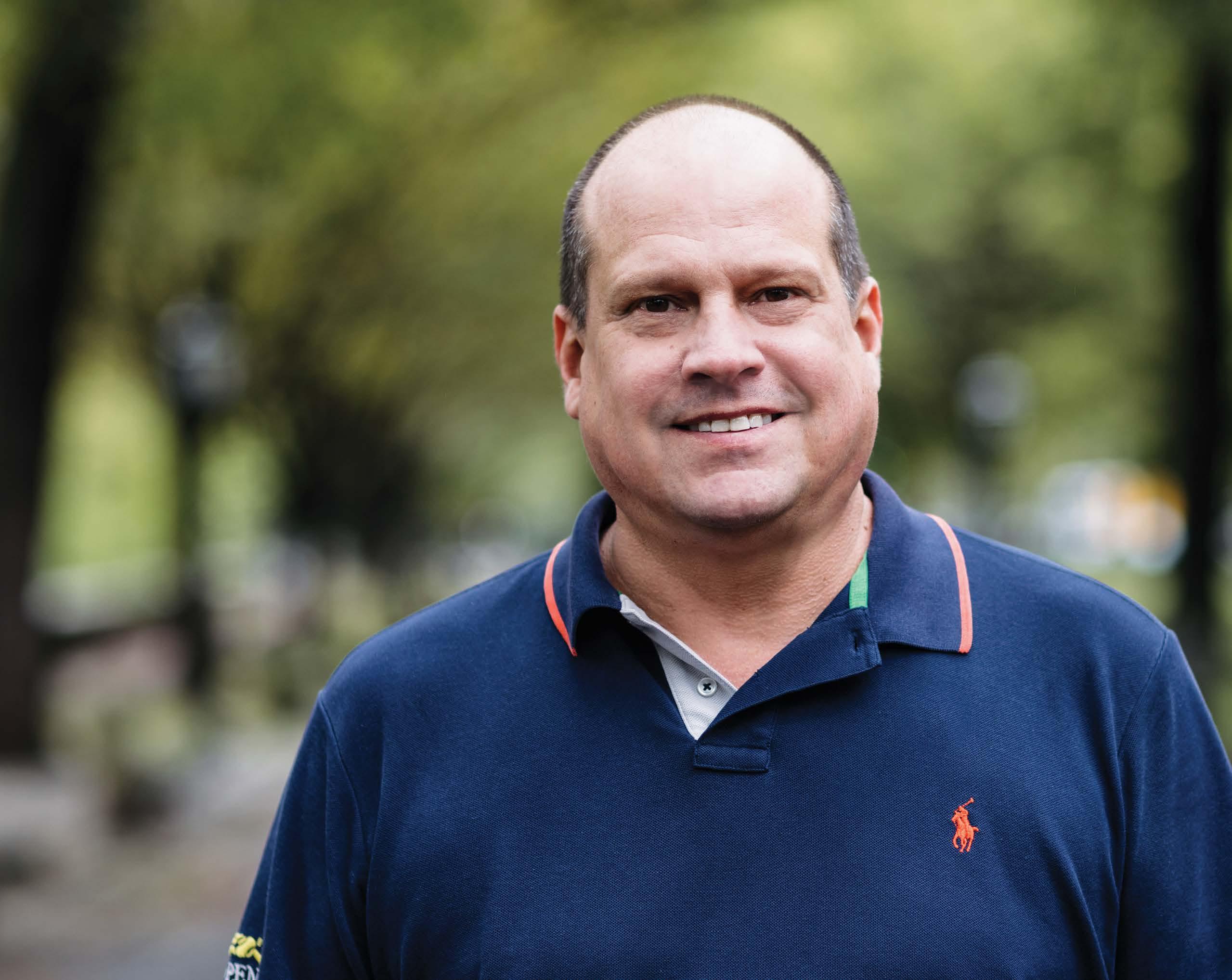
“He was actually what convinced me to move to Los Angeles,” Neppl says. “I was standing on the train platform by Wrigley Field in February with my long underwear on under my suit while he was in L.A. I thought, what’s wrong with this picture?”
After settling in sunny California, Neppl worked a few jobs before landing at Universal Studios as the company’s global controller for theme parks. But Universal would soon experience a series of sales and mergers that ultimately led to a partnership with NBC—and another shift in Neppl’s career.
“I was bought and sold quite a bit during that time,” he says with a laugh. But the moves created a path to the C-suite and the opportunity to serve as CFO for Universal Studios Operations, which houses the company’s backlot of movie sets and film equipment.
Soon, however, New York came calling and Neppl relocated to the East Coast where he became the CFO for NBC Sports and Olympics, working alongside legendary television executive Dick Ebersol. Among the highlights of the job were
attending the 2008 and 2010 Olympics in Beijing and Vancouver. But when the merger marathon continued at NBC—Comcast came in and Ebersol ducked out— Neppl knew it was time to start looking for his next opportunity.
Tennis, anyone? In Neppl’s family, the connection to sports runs deep.
His father was the athletic director at UW-Stevens Point. His older brother worked for both the Minnesota Vikings and Twins. And even before
his tenure at USTA, Neppl himself traveled across the globe to attend all four Grand Slam tournaments.

When an opportunity came in 2012 to join the national governing body for the sport of tennis, he leapt at the chance. Immediately, he was tasked with leading USTA’s effort to finance a $700 million renovation project for Arthur Ashe Stadium, home of the U.S. Open: a tournament that Neppl’s team lovingly refers to as their “bake sale” which funds the organization’s mission.
“That event is where we make the money,” he explains. “Then throughout the rest of the year, we’re actually pushing that money out across the country to help grow the game of tennis from the grassroots level.”
During his first several years with the organization, things ran smoothly. Revenue was flowing and a retractable roof went up over Arthur Ashe in 2016. But when the COVID-19 pandemic emerged in early 2020 and threatened an event that routinely draws 700,000 fans—and millions of dollars in ticket sales and corporate sponsorships—
ED NEPPL (BBA ’90)Neppl admits he had more than a few sleepless nights.
The questions started coming in: Do we need to delay the tournament? Should we move its location? Can we even do this safely?
Ultimately, the decision was made to host the tournament with big changes in place: a bubble for the players, copious amounts of testing, and some rather creative travel plans.
“We had phone calls with the White House trying to make sure that we could get people in or out of the country and the rules kept changing,” Neppl says. “At one point we were even considering chartering planes from all over the world.”
Further complicating matters was USTA’s decision to host the event without fans in the stands. Even with broadcast and sponsorship revenue, the loss of ticket sales created a $180 million budget deficit for the USTA in 2020.
“We really tried to manage expenses and do what we could to make the best of it, but it was just hours and hours of logistics trying to figure it out,” Neppl says. “At the end of the day, it was the right thing
to do, but I don’t think I’ve ever worked harder in my career.”
With the U.S. Open having returned to some semblance of normalcy in 2021 and 2022, Neppl has been able to catch his breath and refocus on USTA’s mission—and even refine it. That includes developing new ways to connect with lapsed players, making the game more inclusive, and figuring out how tennis can coexist alongside other rapidly growing racquet sports like pickleball.
It also means finding time to reconnect with WSB and those who call it home. One of the joys of Neppl’s work is assisting students who reach out to him, as well as talking to student groups when he comes back to UW–Madison.
“It’s an honor to feel like I could be a resource to them,” he says. “I’m really just trying to help people find their way through this crazy life.”
Neppl’s hope is that someone just might turn to one of his mentees at a party one day and say, “You’ve had the most interesting jobs of anyone in this room…” ◀
“I feel an obligation to make sure people can see who I am for real and know that you can be successful in whatever you do.”
For recent graduate and lifelong sports fan Taylor Gilmore (BBA ’22), the opportunity to visit Lambeau Field—while building key leadership skills—was one she couldn’t pass up, even if it meant making the trip to Green Bay just two days after receiving her diploma.

“At first I thought, okay, that’s going to be a lot,” Gilmore says. “But I recognized it as a valuable experience and just thought it would be super cool, so I applied for it. I thought, why not?”
Gilmore was one of 40 Wisconsin School of Business students selected to take part in the inaugural Leadership at Lambeau summit, a three-day immersive experience for undergrads seeking an edge up in their emerging business careers. Modeled after a similar curriculum used by professional sports organizations, the summit offers participants a chance to learn leadership development skills—applicable to any type of business career—from industry professionals, WSB undergraduate program staff, and each other.
unique, customizable experience for emerging leaders
“It really allows participants to step away from day-today life on campus to delve into some proven, top-level curriculum,” says Rick Kempf, undergraduate student life manager for leadership programs. “It was important to create that atmosphere for students to open up and really reflect on their leadership.”
management skills learned through the program. In other words, the badges are an endorsement from WSB that signals a student’s expertise in specific aspects of leadership.
“I think of the badge program as one of the big differentiators between the Wisconsin School of Business and other business schools,”
own pace and customize which workshops they attend.”
TAYLOR GILMORE (BBA ’22)Upon completion of the summit, Gilmore and her fellow students received a special Leadership at Lambeau “badge” to display on their résumés and LinkedIn profiles. It’s one of a handful of certifications that WSB students can now earn through Business Badger Badges, the school’s new cocurricular and customizable leadership development program aimed at providing students not only a competitive advantage in the job market, but also leadership skills applicable at any career stage.
Through participation in specialized workshops, experiences, and reflection activities, students earn digital badges: tangible representations of the high-level leadership and
says Julie Duffstein, director of undergraduate student life. “Participants are really gaining rich skills that are absolutely the things that employers are looking for and the things that are hard to teach in the classroom setting.”
Planning for Business Badger Badges began in 2018, when Duffstein’s team was tasked with building a new businessspecific program modeled after UW–Madison’s Leadership Framework, a comprehensive, campuswide outline of leadership development principles. Soon, the idea for a badgebased system came forward and the program launched in 2019 with two badges: Personal Leadership Styles and Group Dynamics. The Inclusive Leadership badge came next in 2021, followed by two more badges in 2022: Leadership at Lambeau and Leading for Change.
Students can freely pursue the majority of the badges, and time spent earning them can be applied to the 100-hour involvement requirement for a UW–Madison Leadership Certificate. Leadership at Lambeau is the only badge with an application process, as it’s intended to be a signature experience for students who have made significant progress toward completing the requirements of other badges. Skills learned during the threeday summit can be put into action immediately—especially as students step into their summer internships.
“When you go into a company as an intern, you often feel like you’re the very lowest rung on the ladder, and that you can’t apply leadership at that entry-level stage,” Duffstein says. “But coming out of Leadership at Lambeau, students told us they felt more confident being able to use those skills in their internships and early-stage career opportunities.”
As for Gilmore, she didn’t have to wait long to put her newfound skills into action. Shortly after taking part in Leadership at Lambeau, she began a 10-month internship with the College Football Playoff in Irving, Texas. She says she’s grateful for the opportunity to really reflect on her leadership style before fully launching into her business career.
WSB currently offers five badges:
Endorsed by the Wisconsin School of Business
Students can display their badge credential on their LinkedIn profile and résumé.

“We wanted these to be accessible for all Business Badgers,” says Duffstein. “We intentionally made the badges flexible enough so students can do them at their
“The biggest takeaway I had from the experience is just how diverse leadership actually is. Leadership isn’t one thing,” she says. “Every single person has the ability to become a leader, whether they choose to or not. To be able to reflect on that really got me motivated for what’s to come.” ◀
“Every single person has the ability to become a leader.”
Jerald Hage (BBA ’55) had his 1991 article, “Organizational Innovation and Organizational Change,” reach over 20,000 reads. In May 2022, his book, Knowledge Evolution and Societal Transformations: Action Theory to Solve Adaptive Problems, was released in paperback. It explains how one can solve the problems of social inequality with more access to skills, permanent jobs, and a greater political voice for marginalized populations.

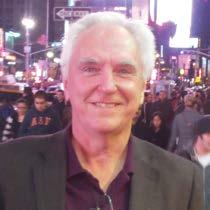
Resources. He was also named in Who’s Who in America and Who’s Who in the World. Ellig has written 134 HR articles and 11 books, including four editions of The Complete Guide to Executive Compensation. Ellig and his wife have visited 150 countries.
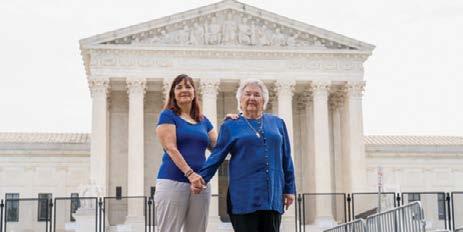
Donald Hildewig (BBA ’59) received the Lifetime Achievement Award for outstanding contributions to the Wisconsin Alumni Association: Suncoast Chapter and UW–Madison. He received the award at the Sarasota/Suncoast Alumni Founder’s Day dinner on May 5, 2022, in Sarasota, Florida.



Steve Cain (BBA ’68) recently celebrated his seventh anniversary of managing the Midwest office of Fairfield Capital Group, LLC, a firm which consults with middle market businesses who are interested in raising capital for equipment leasing purposes.

Benita Alk Lubic (BBA ’58) reflects fondly on her years at UW–Madison and will soon be celebrating 65 years since graduation. Last year, Lubic and her husband, Robert, celebrated their 62nd anniversary, mostly living in Washington, D.C. It is her 63rd year owning Transeair Travel, which has allowed her to travel to over 150 countries. She is blessed with three children and five grandchildren.
Bruce Ellig (BBA ’59, MBA ’60) has funded a chair, a professorship, and two scholarship programs at WSB, in addition to receiving the Distinguished Business Alumnus Award. In his 35 years at Pfizer, he was responsible for worldwide human resources needs. Ellig served as board chair of the Society for Human Resource Management and was a fellow of the National Academy of Human
Martin Feldman (BBA ’64) has enjoyed spending time with his family in Florida, where he is retired. Everyone is doing well, including his wife, Janet, who has been on a cancer journey. He has three grandchildren now, one of whom is applying to colleges. Both of his sons went to UW–Madison, so he is hoping for three generations of Badgers!
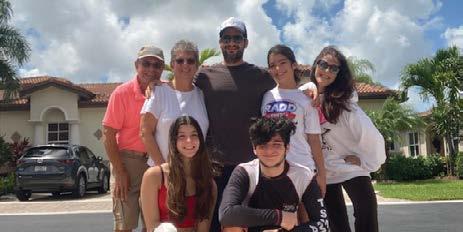
Ira Vernon (BBA ’70) moved back home to South Florida after 10 years in Gainesville, Florida. In Gainesville, he owned a clothing store called Tuesday Morning and met his wife, Penny, whom he married in November 1981. In 1991, he became a wholesale distributor of long steel products, and launched his own company, Concrete Reinforcing Products (CRP), in 2000. CRP is now the largest distributor of rebar in the United States.
William Rauwerdink (BBA ’72) and his private equity firm saw much success throughout 2021 and early 2022, with business dealings in medical technology, apps, and predictive analytic tools. Rauwerdink also helped campaign for several political candidates across the state of Michigan, which taught him new skills in digital marketing.

William Kravit (BBA ’76) is the president of FHK Insurance, an individual health insurance agency serving the Medicare and Affordable Care Act markets for over 50 years. The company is now recognized as a top producer for Aetna, Network Health, and United Health.


Thomas Huismann (BA ’82, MBA ’13) achieved his dream of joining the Boeing team. He will contribute to Boeing’s commitment to training and is very excited to take on the role of professional pilot.
Steve Weber (BBA ’75) and his wife, Deb, were accompanied by Bucky Badger to the 150th
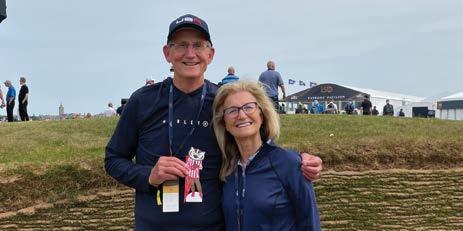
Jo Ann Oravec (MS ’82, MA ’84, MBA ’86, PhD ’92) is excited to announce her forthcoming academic book on the “dark sides” of robotics, autonomous vehicles, and artificial intelligence. She was inspired to explore this
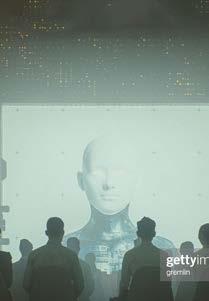
William “Truk” Trukenbrod passed away on May 21, 2022, in Lake Forest, Illinois. He was diagnosed with Parkinson’s disease at age 62 and proceeded to live a full life until his passing.
Truk was a proud member of the U.S. Army Reserves, served as president of the village of Bannockburn, Illinois, and was a board member of the Chicago Crime Commission. He worked at the Northern Trust Bank for 38 years.
topic after reading hundreds of research studies in which the negative aspects of automation were dismissed or deemphasized.
Truk was very involved in the UW–Madison and WSB communities. He was one of the first students to participate in the Reverse Viking Program in which Wisconsin students were selected to study in Scandinavia (a “reverse” of the original program in which Scandinavian
students received scholarships to attend UW–Madison). He later served on the Wisconsin Business Alumni Board from 1988 to 1992 and on the Dean’s Advisory Board from 1998 to 2002. He was instrumental in the building of the Fluno Center for Executive Education.


In addition, Truk was a generous friend of WSB. He supported the school’s Innovation Fund and endowed the William Sellery Trukenbrod Chair in Finance. Those who knew Truk remember him for being incredibly kind and charitable. He loved UW–Madison and was a loyal and passionate Badgers sports fan.
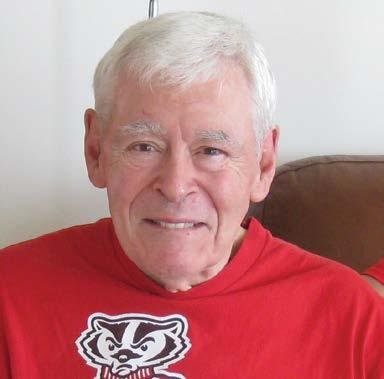
David Rosen (BBA ’84) is delighted to help the Badger State move forward as the newly appointed executive vice president for Wausau Coated Products, Inc.
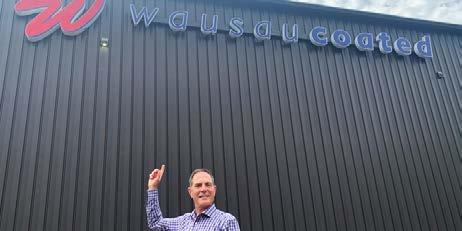

Godfrey & Kahn) and her rocksolid business and law education from UW–Madison!
Douglas Stein (MBA ’89, PhD ’92) was recently named provost and executive vice president at Cleary University, serving as the institution’s chief academic officer. This appointment follows seven years at Colorado Technical University as its vice provost.

the roles of field sales trainer, national training manager, region manager, and senior director of corporate accounts.

Kari (Smith) Potter (BBA ’95) has been appointed vice president of human resources at Agrace, a nonprofit, communitysupported health care organization providing personal care, supportive (palliative) care, hospice services, and grief support to people across southern Wisconsin.
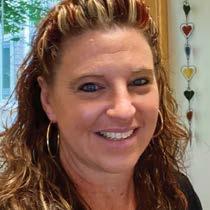

(BS ’94, MBA ’08)
Carol Muratore (BBA ’86, JD ’89) joined MLG Capital in Brookfield, Wisconsin, as an associate general counsel. MLG Capital is a real estate investment firm that warmly welcomed Muratore for her wealth of knowledge and experience as a real estate lawyer (first at Michael Best and then at
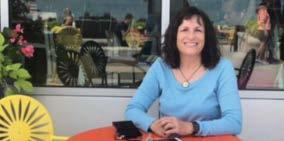
Brian Conom (BBA ’90) was named Surgical Division Monarch Award winner for the second year in a row for his strong sales performance. He was also named to the Royalty Club—the top 15% of sales representatives in the division—for the 12th time. In his over 28 years with Mölnlycke Healthcare, Conom has held
Sally Erdmann (BBA ’98) recently moved from the UW Foundation finance department to the development division. She meets with donors and prospects who love UW–Madison and are interested in making a difference and leaving a legacy through a planned gift.
joined Chadwick School in July 2022 as director of institutional advancement. He is responsible for all fundraising initiatives, alumni relations, and communications for the school.
Jackson spent nearly 15 years at the University of Wisconsin Foundation where he was senior director of development. He attended UW–Madison on a basketball scholarship and was inducted into the UW Athletic Hall of Fame in 2019.

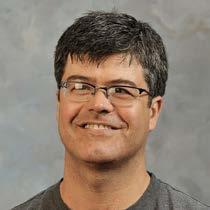



was recently inducted into the UW Athletic Hall of Fame. He helped lead the golf team to four tournament wins, was a multi-year team captain, and served on the UW Student-Athlete Advisory Council. This honor comes just over a year after Lemon passed away of pancreatic cancer at the age of 43. Lemon is remembered not only as a skilled athlete, but as an honorable man who prioritized others above himself.

Jason Stayanovich (BBA ’04) took over an ownership stake and the role of president for CLGT Solutions. CLGT is a veteran-owned small business that provides a variety of services to the federal government. Previously, he was a senior executive at the U.S. Department of Housing and Urban Development, and spent four years serving federal clients at Accenture.
Richard Collumb (MBA ’06) has been appointed to the newly created role of marketing manager at the Irish Business and Employers Confederation, where he focuses on marketing strategy implementation. Collumb says he’s proud to keep flying the Badger flag in Ireland!



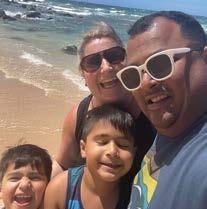
Mike Webber (BBA ’06) has been promoted to partner in the nonprofit and government practice at Wipfli LLP. Webber has over 15 years of experience in auditing nonprofit organizations, which give him a deep understanding of the challenges they face. Clients appreciate his attention to detail and dedication to helping them achieve their mission.
Saqib Mustafa (MBA ’07) runs partner marketing at the data cloud company Snowflake Inc. His wife, Nicole, has the tougher job of raising their two boys as Packer and Badger fans: Shahbaz (6) and Khaleel (4). Their family recently settled in the Burlingame area of the San Francisco Peninsula. Mustafa wants to offer a big shout-out to his UW–Madison mentor, Paul Shain, for his advice.
Andrea Mitchell (MA ’04) accepted a new opportunity as director of marketing and membership for the American Orthopaedic Society for Sports Medicine, the professional home for surgeons and other clinical professionals focused on keeping athletes of all levels in the game. She previously spent three years as director of content marketing for the American College of Healthcare Executives.
Joseph Coyne (BBA ’07) and his wife, Liza, welcomed baby boy Brooks this year, who joins big sisters Catherine and Lillian (5-year-old twins). Professionally, Coyne is the managing partner of Studio VC, an early stage venture capital firm based in New York City. The Studio VC team concentrates on enterprise software and internet investments.

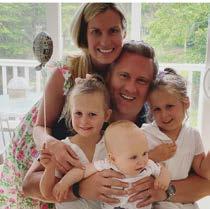
Pamela Andersen (BBA ’08) was promoted to managing director at FTI Consulting in April 2022. Andersen works in the Lender Services and Corporate Finance practice, providing financial diligence services to lenders, private equity firms, and companies in all industries. She married Scott Johnson in October 2022.
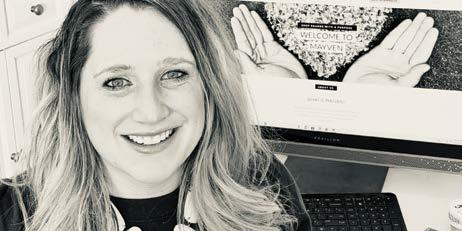
Dewayne Buratti (MBA ’12) joined Bespoke Stay, a full-service hospitality company, in May 2022. As the revenue manager, Buratti is responsible for the revenue of over 140 units, as well as revenue projection of potential properties, developing key performance indicators for each market, and researching pricing trends that affect revenue.
Megan Nufer (BBA ’09) is the founder of consumer technology startup Mayven, which recently entered into a strategic partnership with artificial intelligence and sustainable technology company Smarter Sorting. Smarter Sorting’s product and development teams will work closely with Nufer as she expands Mayven’s capabilities and brings it to a new audience of consumers.
Brock Hensen (BS ’12, MBA ’21) is the chief operating officer of EnsoData, a healthcare artificial intelligence company founded by UW–Madison alumni. The company announced the closing of a $20 million Series A extension, with funding from Inspire Medical Systems, Inc. and existing investors. This news comes on the heels of EnsoData winning Inc. magazine’s Best Workplaces award for the second year in a row.

(BBA ’12)
was awarded the 2022 Forward Award from the Wisconsin Alumni Association. Lorenz is the founder of Campo Alpaca, a fair-trade apparel company that provides Peruvian communities with employment opportunities, fair compensation, and a safe working environment.
location for Hoege Consulting & Coaching and Waunakee Coworks in Waunakee, Wisconsin, which offers coworking space for other like-minded professionals looking to get out of the home office.

Cassie Warton (BBA ’19) joined BP’s rotational program after her graduation from UW–Madison, holding roles in finance, strategy, and marketing. She resides in Chicago and is responsible for helping market and execute BP’s loyalty strategy.
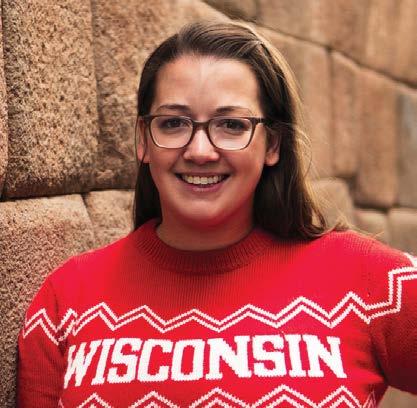
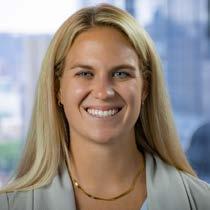
“A few weeks ago, I started my new career journey at Intel Corporation! I went to Wisconsin School of Business to pursue my MBA and a career in tech marketing. 2 years later, here I am. Hard work, a strong support system (you know who you are), and endless pursuit of my dreams got me here.”
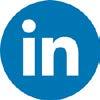
 JOSELINE NYINAWABERA
JOSELINE NYINAWABERA
“Excited to share that today
Laura Reich (BBA ‘13) produced her second feature film, All Sorts, which is available to stream on Amazon, Google Play, and Apple TV+. It follows the story of a down-on-his-luck office worker as he dives into the world of championship folder filing.
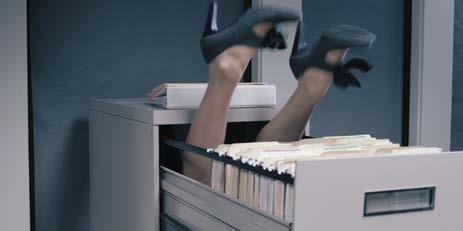
I started a new full-time role as the Data Analytics Manager for Betsperts Media & Technology Group, working closely with our 4for4 Fantasy Football brand! This is truly a dream job and it’s surreal that I’ve been given this opportunity.

I cannot wait to help these brands grow, so let the next chapter begin!”


 SAM HOPPEN (BBA ’15)
SAM HOPPEN (BBA ’15)
Jennifer Hoege (MBA ’14) is excited to announce the official
(BBA ’13, MBA ’22)


Henry Mirsberger (BBA ’20, MAcc ’21) moved to Connecticut after receiving his master’s degree to join the Financial Accounting Standards Board. As apostgraduate technical assistant, Mirsberger improved accounting standards that dictate financial reporting for all public, private, and notfor-profit entities in the U.S.

In September 2022, he joined the Analysis Group in Chicago as an associate in economic consulting.
Sarah Plotkin (BBA ’21) completed one year at Macy’s, primarily in a site merchandising role focusing specifically on watches, but she has also provided website support. She has enjoyed her experience so far and is excited to continue growing her career! ◀


Winter, spring, summer, or fall, WSB is always in season. From the colorful spring blooms in nearby gardens to the vibrant autumn leaves of the surrounding trees, Grainger Hall is the perfect backdrop for a business education— no matter the time of year. ◀


